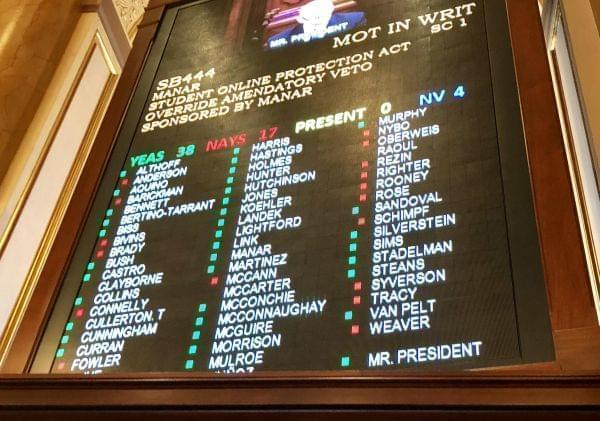Veto Override Removes One School Funding Hurdle

The Illinois General Assembly voted to override Gov. Bruce Rauner's veto of a school funding trailer bill. Dusty Rhodes/NPR Illinois
Less than an hour before Gov. Bruce Rauner was scheduled to deliver his State of the State address, lawmakers in the House and Senate voted to override his veto of a small, technical school funding bill necessary to implement the massive school funding reform that Rauner has listed as his main accomplishment.
That reform (SB 1947), approved last summer, would send $350 million in new funding to the neediest school districts. But so far, the state hasn't sent out even one of those new dollars, thanks in part to Rauner's veto of SB 444, a technical cleanup measure meant to align the school code with the financial models lawmakers relied on when they cast their votes on SB 1947.
Rauner used his amendatory veto powers to try to expand a tax credit program for private schools that had been added to the reform bill in a last-minute, bipartisan compromise. Last week, the Illinois State Board of Education and the Illinois Department of Revenue — two state agencies under Rauner’s leadership — negotiated a compromise on the governor's veto. How this override affects that compromise remains unclear.
"This is a big confusing mess and it results from an unnecessary veto that Gov. Rauner made to that trailer bill,” says Andy Manar, the Democratic State Senator from Bunker Hill who has been pushing school funding reform for about five years. "We are in this position because that veto was completely unnecessary, and this entire situation was completely avoidable."
The override passed 38-17 in the Senate, despite the objections of minority leader Bill Brady (R-Bloomington), who argued that it would be better to let the 550-page reform bill be implemented as-is. “When we negotiate and pass something as monumental as the education reform proposal, which we did in a bipartisan way, we need to stick with that agreement and let time serve out and see what really happens,” he said.
However, in education committee hearings, ISBE staff has testified that getting details buttoned is crucial, because the first year of funding under this new model sets a standard that will affect subsequent funding distributions.
The House had voted unanimously for SB 444, and approved the override by a vote of 90-18.
Manar said he's now focused on ISBE, which recently sent lawmakers a list of 23 changes it says are still needed. Ten of those items would affect how funds are distributed. ISBE isn’t requesting more money, just clarification.
In an email, ISBE communications director Jackie Matthews characterized the 23 items as “discrepancies between legislative intent and the language codified in” the bill. She said the items were identified by staff and by stakeholders who participated in community meetings and webinars hosted by ISBE over the past several months. Matthews wrote that ISBE is on schedule to submit vouchers for this new money to the comptroller in April.
Manar — chief sponsor of the reform legislation — is skeptical.
"I have no belief today that that's going to be their final list of what they refer to as ‘tweaks,’” he says. “I want to know when they're going to be done."
Asked if he's suggesting some sort of malfeasance, Manar said "not quite, but close."
Links
- Education Board Calls For Swift Action On School Funding
- After Rauner Veto, Lawmakers Consider Next Steps On School Funding
- Private Schools In Limbo As General Assembly And Governor Haggle Over School Funding Language
- Bill Links Private School Tax Break To Public School Funding
- Governor Signs School Funding Reform Bill
